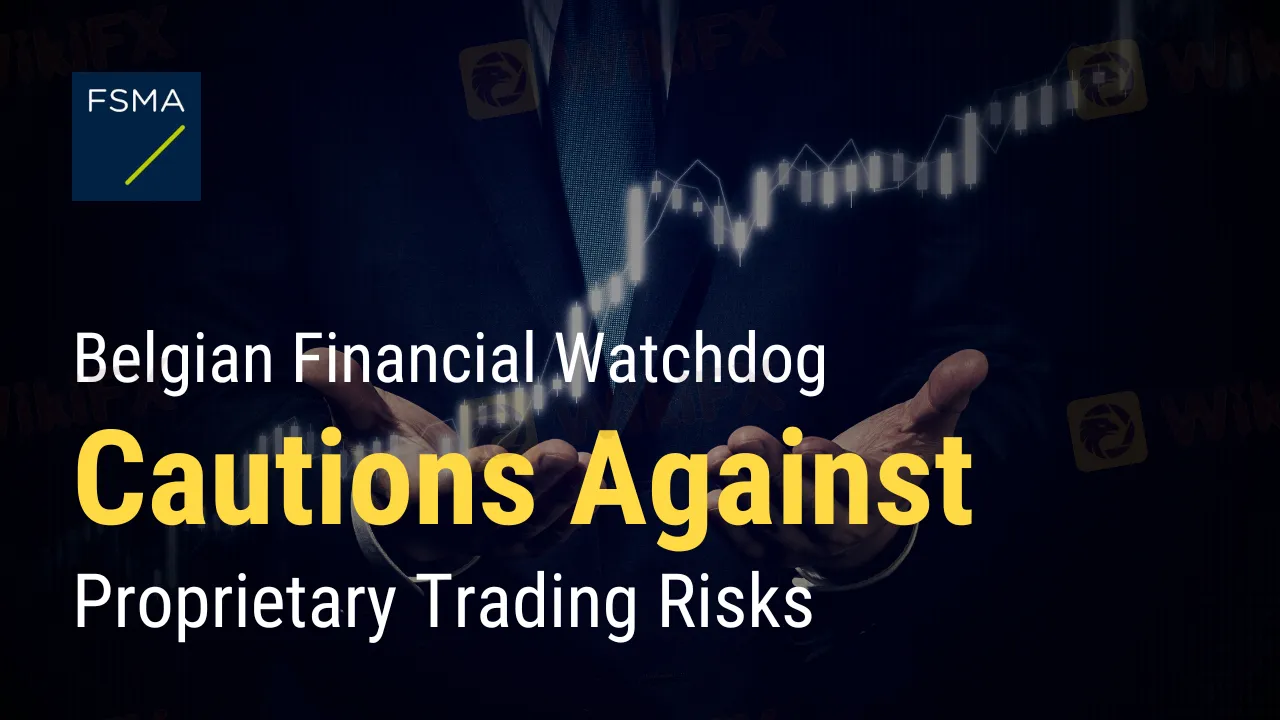简体中文
繁體中文
English
Pусский
日本語
ภาษาไทย
Tiếng Việt
Bahasa Indonesia
Español
हिन्दी
Filippiiniläinen
Français
Deutsch
Português
Türkçe
한국어
العربية
Belgian Financial Watchdog Cautions Against Proprietary Trading Risks
Abstract:US proprietary trading sector faces setback. MetaQuotes revokes licenses, forcing firms to halt new registrations. Uncertain future looms. Belgian FSMA warns traders of risks. Traders face challenges in costly training. Some never pass, firms profit. FSMA notes use of demo accounts for commissions, terms unclear. FSMA cautions against trading, urges scrutiny of associated ecosystems. Proprietary firms not authorized for financial services. Heed FSMA warning for safer trading.

A significant setback has just occurred for the US proprietary trading sector. A major participant in the trading platform industry, MetaQuotes, created a stir last month when it revoked licenses from many proprietary trading companies. Affected organizations are struggling to come up with other solutions in the wake of this abrupt action, which has forced them to pause new customer registrations while they look for workable alternatives. Even though some companies have switched trading platforms, the industry's future is uncertain.
The Belgian Financial Services and Markets Authority's (FSMA) website issues a warning. The FSMA has warned traders to be wary of proprietary trading companies. These businesses are experts at luring people into trading, sometimes focusing specifically on intricate financial products like Forex and Contracts for Difference (CFDs). Regulatory agencies like the FSMA have taken notice of this precise emphasis.
A trader's path to success is not easy, as the Financial Services and Market Association (FSMA) claims. These businesses need costly, time-consuming, and a lot of training. It is a requirement for traders to take these courses and pay the associated fees. Nevertheless, despite their best efforts, some dealers may not be able to get past these barriers, leaving them empty-handed. Regrettably, these companies continue to profit from the encounter.

Furthermore, the Financial Services and Market Association (FSMA) has drawn attention to situations where certified traders choose to forgo live trading using the company's demo accounts. Traders may only be eligible for commissions after demonstrating profitability in these virtual settings. But since proprietary trading organizations' terms are so ambiguous, it's sometimes impossible for customers to determine how much they may potentially earn in commissions.
Alongside this trend—which has corresponded with an increase in consumer inquiries—the FSMA has also seen the increased visibility of proprietary trading company marketing across different social media platforms. The fact that some of these businesses even charge for courses designed to help people pass the necessary exams raises concerns about the industry's accessibility and openness.
The FSMA has strongly cautioned against proprietary trading in light of these increased risks. It has also advised consumers to exercise caution while examining associated ecosystems, such as training programs and trading platforms. The allure of the game elements included in these transactions poses a risk as it may push clients to behave hastily and irresponsibly.
The Financial Services and Market Authority (FSMA) has stressed that proprietary trading firms cannot offer financial services. The FSMA stresses that clients must research these firms before doing business with them.
Therefore, the warning from the FSMA serves as a clear reminder of the possible risks associated with the world of proprietary trading. Traders may traverse this complicated terrain with more assurance and awareness by following this advice to the letter and being watchful.

Disclaimer:
The views in this article only represent the author's personal views, and do not constitute investment advice on this platform. This platform does not guarantee the accuracy, completeness and timeliness of the information in the article, and will not be liable for any loss caused by the use of or reliance on the information in the article.
Read more

Banxso’s License Suspended by South African Regulator Amid Client Risk Concerns
South Africa’s Financial Sector Conduct Authority (FSCA) has suspended the license of the online trading platform, Banxso.

FINRA Fines Investment Network and CEO for Misconduct in Pre-IPO Offerings
The Financial Industry Regulatory Authority (FINRA) has imposed significant fines on Investment Network, Inc. (INI) and its CEO, Gary L. Arnold, for a series of regulatory violations connected to the sale of pre-initial public offering (pre-IPO) funds between October 2020 and May 2021.

$360 Million International Pig-Butchering Scam Busted in Hong Kong
Hong Kong’s law enforcement has successfully dismantled a large-scale pig-butchering scam operation, which had amassed HK$360 million through fraudulent online schemes within the span of a year.

XM Launches US Election Mega Competition with $100,000 in Prizes
Join XM's US Election Mega Competition from Oct 31 to Nov 14, 2024, for a chance to win a share of $100,000 in cash prizes by trading election market volatility.
WikiFX Broker
Latest News
Ex-Philippine Mayor Tied to $30M Crypto Scam Unveiled
IFEXCAPITAL: Broker Review 2024
RM3.46 Million Lost in Fake Online Investment Scheme
Alleged Hong Kong Crypto Swindler Su Weiyi Faces Fraud Charges
Interactive Brokers Opens New Office in Dubai DIFC
WikiFX Review: Something You Need to Know about Hyperion Markets
Scalping vs. Swing Trading: Which Strategy Suits You?
Hong Kong Police Crack Down on $360M Romance Crypto Scam
XM Launches US Election Mega Competition with $100,000 in Prizes
XM US ELECTION PROMOTION
Currency Calculator


